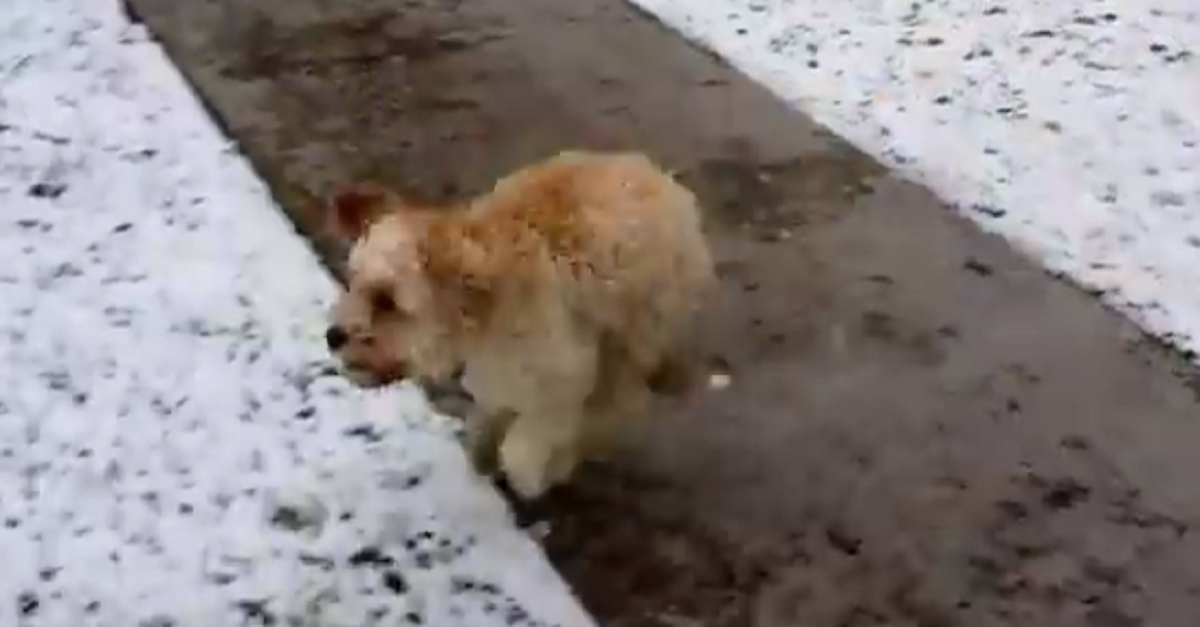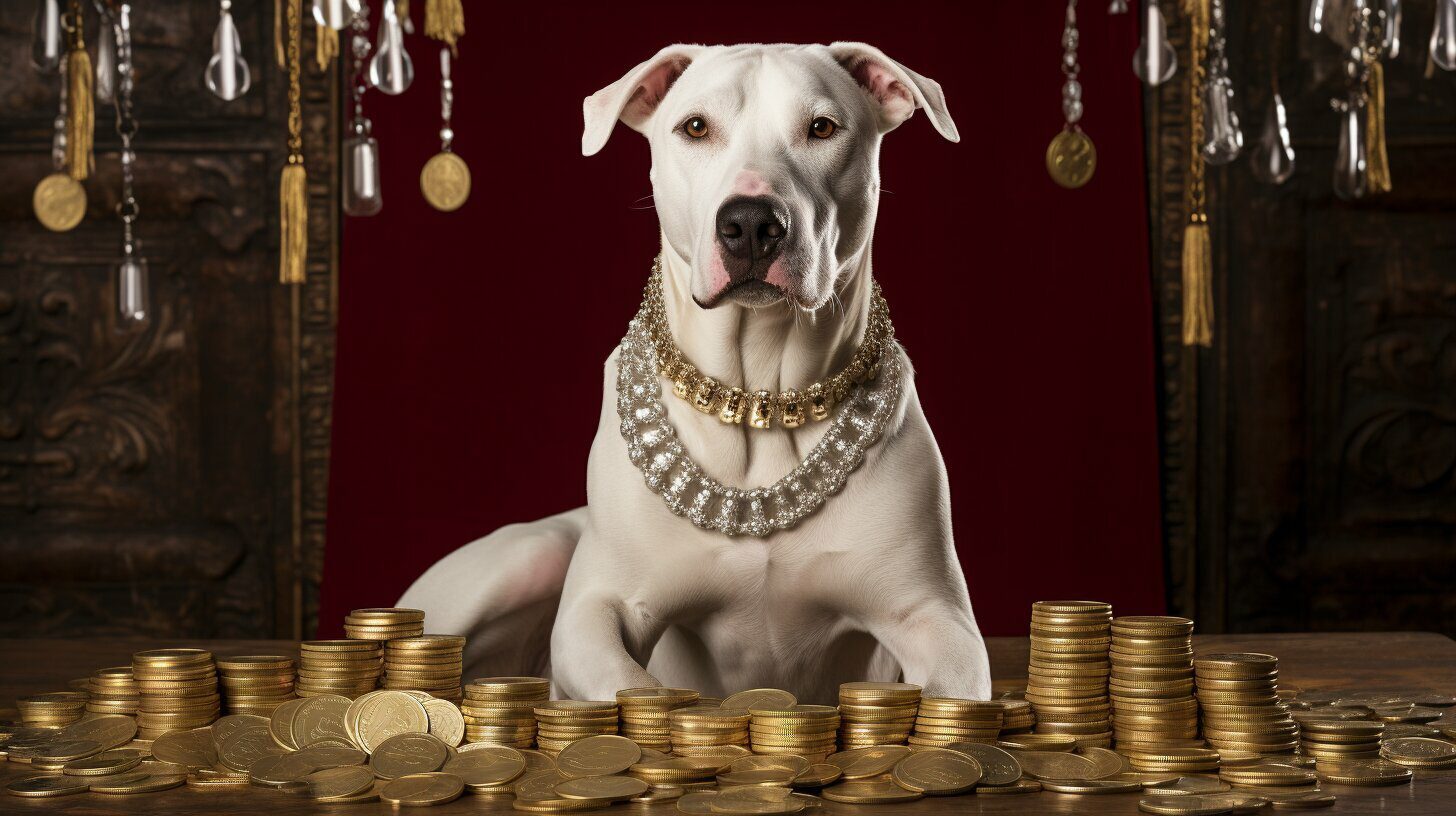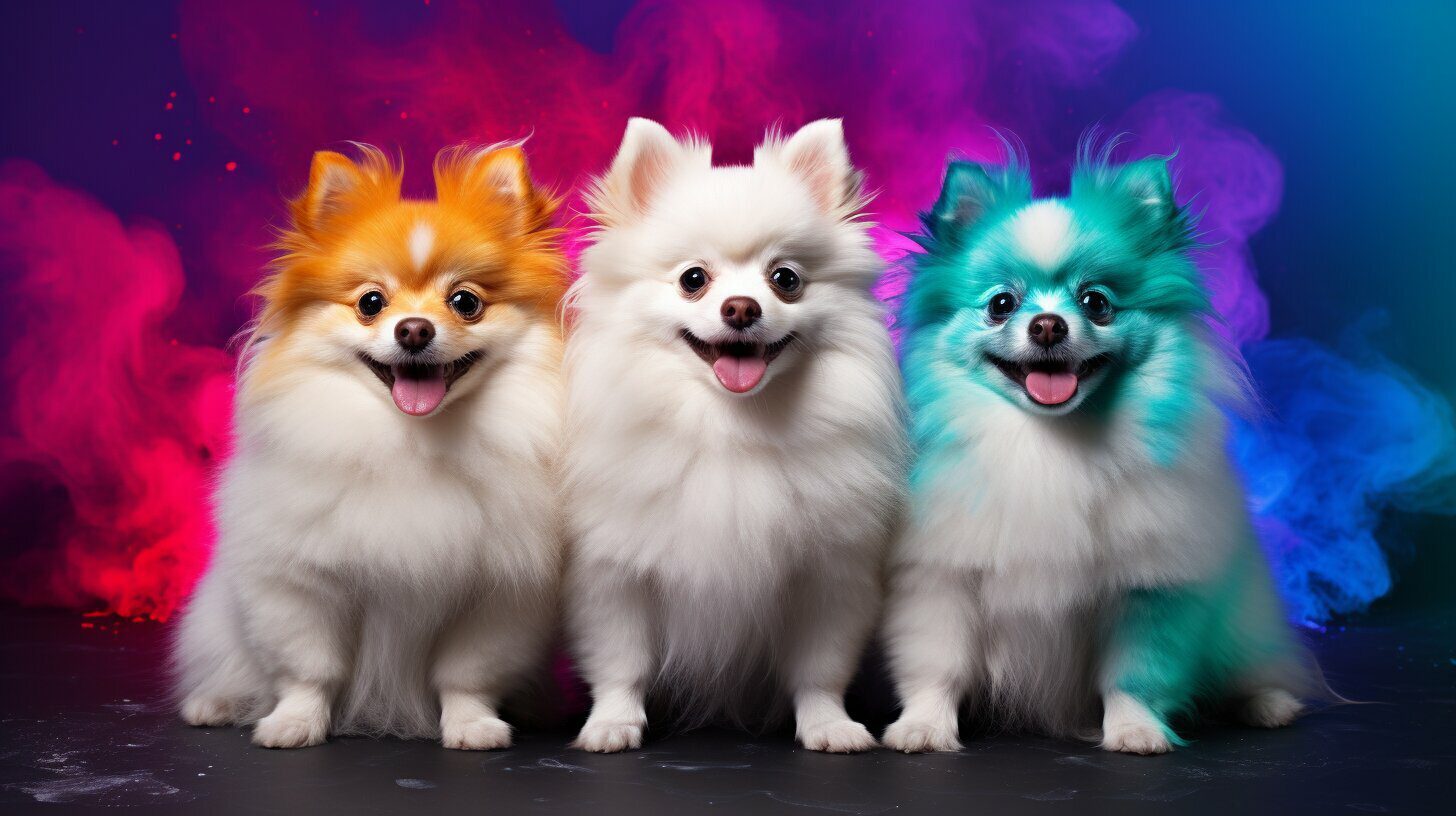The Doberman Pinscher is a remarkable breed known for their exceptional intelligence, loyalty, and obedience. If you’re considering bringing a Doberman into your home, it’s important to understand their unique characteristics and the training tips that can help you unleash their full potential.
Doberman Pinschers are widely regarded as one of the most intelligent dog breeds. Their high level of intelligence enables them to quickly grasp commands and learn complex tasks. With the right training approach, they can be skilled at various activities and excel in performance tasks. Their intelligence also makes them highly trainable, allowing them to adapt to different situations and environments.
Aside from their intelligence, Dobermans are naturally loyal and protective of their families. They have a strong bond with their owners and are always willing to please. Their loyalty combined with their intelligence makes them highly responsive to training and eager to learn.
Proper mental stimulation is essential for Doberman Pinschers. These intelligent dogs thrive when they have challenging tasks to focus on. Engaging them in activities that require problem-solving and critical thinking can help prevent boredom and destructive behavior.
To ensure that your Doberman Pinscher reaches its full potential, consistent and positive training methods are key. Establishing clear boundaries and providing structured routines will help your Doberman understand their role within the family pack. With the right guidance, you can shape their behavior and mold them into obedient and well-behaved companions.
Remember, training a Doberman requires patience, consistency, and a firm but gentle approach. By investing time and effort into their training, you will be rewarded with a loyal, intelligent, and well-behaved companion.
Are Doberman Pinschers Smart?
- Doberman Pinschers are highly intelligent and trainable.
- They are fiercely loyal and protective of their families.
- Mental stimulation is crucial for their overall well-being.
- Consistent and positive training methods yield the best results.
- Investing time and effort in their training will result in a loyal and well-behaved companion.
A Little Doberman Pinscher History
Let’s delve into the fascinating history of the Doberman Pinscher breed and discover how they became the loyal and fearless companions they are known as today.
The Doberman Pinscher breed was created by a German tax collector named Louis Dobermann in the late 19th century. Dobermann aimed to develop a dog breed that would excel as both a guard dog and a loyal companion. He selectively bred various dog breeds, including the Rottweiler, German Pinscher, and Weimaraner, to create the Doberman Pinscher.
The Doberman Pinscher quickly gained a reputation for its exceptional loyalty, courage, and vigilance. They were originally used as guard dogs, police dogs, and in military services due to their sharp instincts and disciplined nature.
During World War II, Doberman Pinschers worked alongside the Marines, serving as messengers, guards, and sentries. Their exceptional intelligence and trainability made them invaluable in various tasks. Their loyalty and devotion to their human counterparts were unmatched.
Over time, the Doberman Pinscher’s reputation shifted from a purely working dog to also being a beloved family pet. Their attributes of loyalty, courage, and vigilance made them ideal companions and protectors for families.
Today, the Doberman Pinscher continues to be loved and cherished as both a devoted family pet and a capable working dog. Their history of loyalty to their owners and their unwavering courage and vigilance is deeply ingrained in their breed.
What are Doberman Pinschers Like?
Doberman Pinschers are strong and intelligent working dogs. With their distinctive appearance and sharp minds, they possess remarkable characteristics that set them apart from other breeds. Their intelligence allows them to excel in various activities and tasks, making them highly sought-after companions.
- Intelligence: Doberman Pinschers are renowned for their intelligence. They have a keen ability to learn and understand complex commands, making them quick learners. Their high level of intelligence enables them to grasp new concepts and adapt to different situations with ease.
- Reading Human Emotions: One impressive aspect of a Doberman Pinscher’s intelligence is their ability to read human emotions. They have an intuitive understanding of their owner’s feelings, making them affectionate and loyal companions. This unique trait allows them to provide comfort and support when needed.
- High Energy: Doberman Pinschers possess a vibrant and energetic nature. They have a natural drive to work, making them excellent in various roles, from search and rescue to competitive sports. Their high energy levels make them the ideal companion for active individuals or families.
- Exercise Needs: Due to their high energy levels, Doberman Pinschers require plenty of exercise to stay happy and healthy. Engaging in physical activities such as daily walks, runs, or play sessions is essential to prevent destructive behavior caused by pent-up energy.
- Routines: Doberman Pinschers thrive on routines and thrive when they know what to expect. Establishing a consistent daily routine provides them with a sense of structure and stability, which can contribute to their overall well-being.
To visually demonstrate the energetic nature of Doberman Pinschers, take a look at the image below:
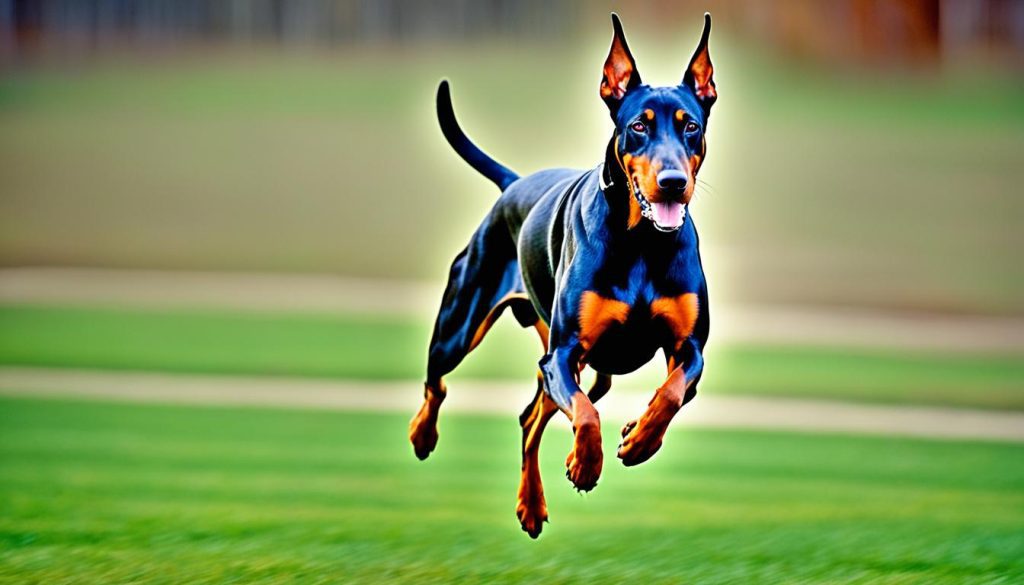
Doberman Pinscher Characteristics
| Characteristic | Description |
|---|---|
| Intelligence | Highly intelligent and quick learners |
| Emotional Sensitivity | Capable of reading and responding to human emotions |
| Energy Levels | High energy and require regular exercise |
| Trainability | Responsive to training and eager to please |
| Loyalty | Dedicated and loyal to their families |
Doberman Pinschers have a remarkable combination of intelligence, responsiveness, and loyalty. Their distinctive characteristics make them admirable companions, working dogs, and beloved family pets.
The Importance of Basic Training for Your Doberman Pinscher Puppy
When it comes to raising a Doberman Pinscher puppy, training plays a crucial role in shaping their behavior and ensuring a harmonious relationship between you and your furry companion. Doberman Pinschers are highly intelligent and responsive, making them eager learners. By providing clear and consistent guidance from the start, you can set the foundation for a well-behaved and happy dog.
Training should ideally begin when your Doberman puppy is still young and impressionable. This early start allows them to understand the rules, boundaries, and expectations within the household. By establishing yourself as the pack leader, you can effectively convey what is acceptable behavior.
Firm and consistent discipline is important in Doberman Pinscher puppy training. This breed requires a confident leader who can provide gentle but assertive guidance. From basic commands to house rules, consistent reinforcement will help your puppy grasp the desired behaviors.
There are various training methods you can employ to achieve the desired results. Positive reinforcement, such as rewarding your puppy with treats or praise for displaying desired behaviors, can be highly effective. This approach encourages your Doberman Pinscher to associate training with positive experiences, fostering enthusiasm and cooperation.
The Pack Leader Principle
Establishing yourself as the pack leader is essential in Doberman Pinscher training. While Dobermans are known for their loyalty, they thrive when they have a strong and confident leader to follow. By assuming this role, you create a sense of order and teach your puppy to respect your authority.
Being a pack leader involves providing consistent guidance, setting rules, and enforcing them with fair and firm discipline. This not only helps prevent unwanted behaviors but also strengthens the bond between you and your Doberman Pinscher.
Remember that each Doberman Pinscher is unique, so tailor your training approach to your puppy’s individual needs and personality. Some puppies may respond better to a specific training method or require additional patience. Understanding and addressing your puppy’s specific requirements will help you achieve the best results.
Training your Doberman Pinscher puppy requires time, dedication, and patience. By providing clear and consistent guidance, establishing yourself as the pack leader, and utilizing effective training methods, you can shape your puppy into a well-mannered and obedient companion.
Be the Pack Leader Your Loyal Companion Needs
When it comes to training a Doberman Pinscher, being the pack leader is crucial. These loyal and intelligent dogs need to perceive their owner as the firm and consistent leader. They thrive when their training is conducted by someone they trust and are dedicated to pleasing. Establishing yourself as a strong leader from a young age is essential for a well-behaved and obedient Doberman.
To be an effective pack leader, it is important to exercise patience, consistency, and firm discipline. Dobermans respond well to clear expectations and boundaries. They need to understand their place in the pack hierarchy and must see you as the one in charge. With a firm and assertive approach, you can earn their respect and loyalty.
Training exercises play a vital role in your journey to becoming the pack leader. These exercises not only provide mental stimulation but also help establish your authority. Incorporate structured training sessions into your daily routine and focus on commands that reinforce your position as the leader. Consistency is key, as Dobermans respond best to routines and clear guidelines.
Example Training Exercise:
- Teaching the “Sit-Stay” Command: This exercise helps establish your control and reinforces the idea of waiting for your command.
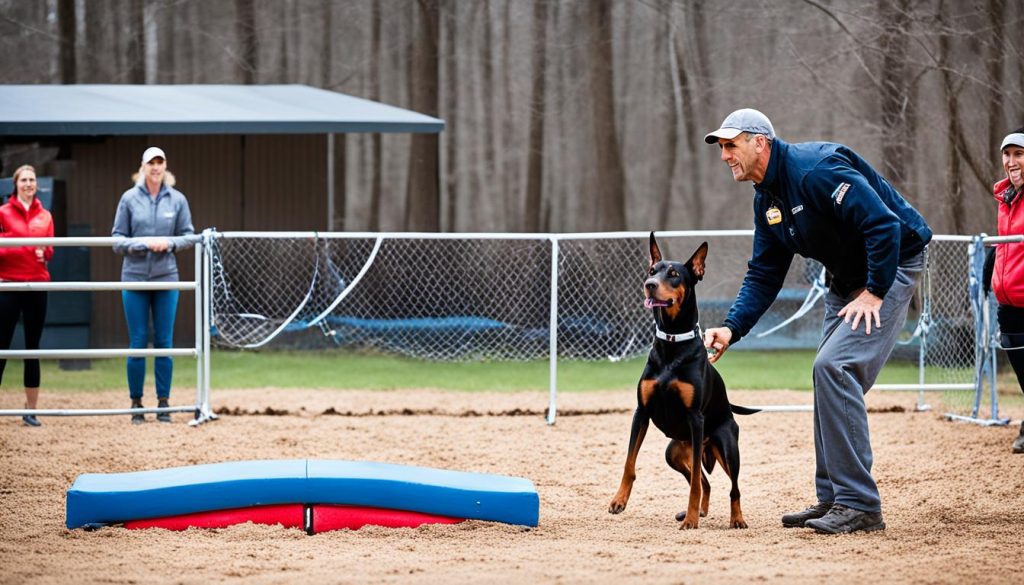
| Steps | Tips |
|---|---|
| 1. Start in a quiet, distraction-free area. | – Use treats as rewards for positive reinforcement. – Use a firm, authoritative voice when giving commands. |
| 2. Command your Doberman to sit. | – Use a single-word command, such as “Sit.” – Place your hand on their lower back to guide them into the sitting position. |
| 3. Once they are sitting, give the command to stay. | – Use a single-word command, such as “Stay.” – Stand in front of your Doberman with your palm facing them as a visual cue. |
| 4. Take a step back and wait for a few seconds. | – Use a clicker or a verbal cue, such as “Good,” to indicate their success in staying in the sitting position. – Gradually increase the time they need to stay before rewarding them. |
| 5. Release your Doberman from the command with a release word like “Okay.” | – Praise and reward your Doberman with a treat and affection. – Repeat the exercise several times to reinforce the command. |
The Training Process
Training a Doberman involves provoking the desired behavior, using verbal and visual cues, and rewarding the behavior. It is important to use positive reinforcement to motivate the dog and associate training with rewards. Each dog is different, so training should be tailored to individual needs and goals.
When training a Doberman, the first step is to understand the desired behavior you want to promote. Whether it’s obedience commands, agility training, or specific tasks, clearly define your training goals.
To provoke the desired behavior, it’s important to use behavior provocation techniques. For example, if you want your Doberman to sit on command, gently push their hindquarters down while saying the cue word “sit”. Repeat this action consistently and reward your dog when they respond correctly.
Verbal and visual cues play a critical role in Doberman training. Use clear and consistent verbal commands when teaching your dog new behaviors. Combine these commands with hand signals or visual cues to further reinforce understanding.
Positive reinforcement is key to motivating your Doberman during training. Whenever your dog exhibits the desired behavior, immediately reward them with verbal praise, treats, or toys. This positive association helps your Doberman understand that their actions lead to rewards.
Remember that every Doberman is unique. Tailor your training approach to suit their individual needs, strengths, and weaknesses. Some dogs may respond better to certain training methods or may require different levels of reinforcement. Pay attention to your dog’s progress and adjust your training techniques accordingly.
Tips for Effective Doberman Training
- Be patient and consistent with your training sessions.
- Keep training sessions short and engaging to maintain your dog’s focus.
- Use high-value treats or rewards to motivate your Doberman.
- Practice training in different environments to generalize behaviors.
- Seek professional guidance if you encounter specific challenges or behavioral issues.
Every Dog is Different
When it comes to Doberman Pinschers, it’s important to remember that each dog is unique. They have their own individual personality traits and training needs that must be taken into account. As an owner, it’s essential to tailor the training approach to meet the specific goals and requirements of your Doberman.
If you’re training your Doberman Pinscher for a specific purpose, such as guard dog training, the training methods and focus will be different than if you’re training them to be a family pet. Understanding the needs and priorities of your dog will help you create a training program that is effective and successful.
The Individuality of Dobermans
Dobermans have a wide range of temperaments and behaviors. Some may be naturally more dominant or protective, while others may be more laid-back and easygoing. This individuality should be taken into consideration during training.
For example, a Doberman with a strong protective instinct may benefit from guard dog training, focusing on obedience, protection, and alertness. On the other hand, a Doberman with a calm and friendly disposition may thrive in family pet training, where the emphasis is on socialization, manners, and being an enjoyable companion.
Training Tailored to Specific Needs
Training a Doberman to fulfill their specific needs requires a customized approach. This means assessing your dog’s strengths, weaknesses, and natural inclinations, and tailoring the training techniques accordingly.
For guard dog training, it’s important to focus on behaviors such as controlled aggression, alertness, and responding to commands. Family pet training, on the other hand, may involve basic obedience commands, socialization with people and other animals, and appropriate behaviors within the home.
Understanding Your Dog’s Needs
The key to successful Doberman training is understanding your dog’s needs. This involves recognizing their unique traits, observing their behaviors, and adjusting the training methods accordingly.
By being attuned to your Doberman’s individuality, you’ll be able to tailor the training program to address their specific needs, ensuring a more productive and enjoyable training experience for both you and your pet.
Conclusion
Doberman Pinschers are highly intelligent dogs known for their unwavering loyalty and exceptional obedience. With the right training and mental stimulation, these intelligent canines can thrive in various roles, whether it be as dedicated guard dogs or beloved family pets.
Training plays a pivotal role in maximizing the potential of a Doberman Pinscher. Starting from a young age, a comprehensive training program should be tailored to the individual needs and temperament of each dog. By providing them with clear guidance and consistent discipline, owners can establish themselves as the pack leaders, earning the respect and cooperation of these magnificent creatures.
A well-trained Doberman Pinscher is a content and reliable companion. It is important to nurture their intelligence through engaging activities and mental stimulation. This can include challenging puzzle toys, obedience training sessions, and interactive games that reward their problem-solving abilities.
When it comes to loyalty and intelligence, Doberman Pinschers truly shine. By investing time and effort into their training and mental enrichment, these remarkable dogs can become not only fiercely protective guardians but also affectionate and loyal family pets.



